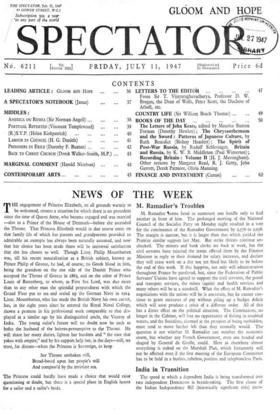M. Ramadier's Troubles
M. Ramadier teems fated to surmount one hurdle only to find another in front of him. The prolonged meeting of the National Council of the Socialist Party on Monday night resulted in a vote for the continuance of the Ramadier Government by 2,576 to 2,058. The margin is narrow, but it is larger than that which yielded the Premier similar support last May. But strike threats continue un- checked. The miners and bank clerks are back at work, but the civil servants have rejected the terms offered them by the Finance Minister in reply to their demand for salary increases, and declare they will cease work on a day not yet fixed but likely to be before the end of this week. If this happens, not only will administration throughout France be paralysed, but, since the Federation of Public Servants' Unions have agreed to support the civil servants, the postal and transport services, the mines (again) and health services and many others will be at a standstill. What the effect of M. Ramadier's negotiations with the unions will be is uncertain, but he cannot con- tinue to grant increases of pay without piling up a budget deficit which will soon produce a crisis of a different order. All of this has a direct effect on the political situation. The Communists, no longer in the Cabinet, will lose no opportunity of fishing in troubled waters, and the Socialists, alarmed at the prospect of being outbidden, must tend to move further left than they normally would. The question is not whether M. Ramadier can weather the economic storm, but whether any French Government, even one headed and shaped by General de Gaulle, could. Here as elsewhere almost everything is staked on the Marshall Plan, which fortunately will not be affected even if the first meeting of the European Committee has to be held in a busless, tubeless, postless and telephoneless Paris.


































